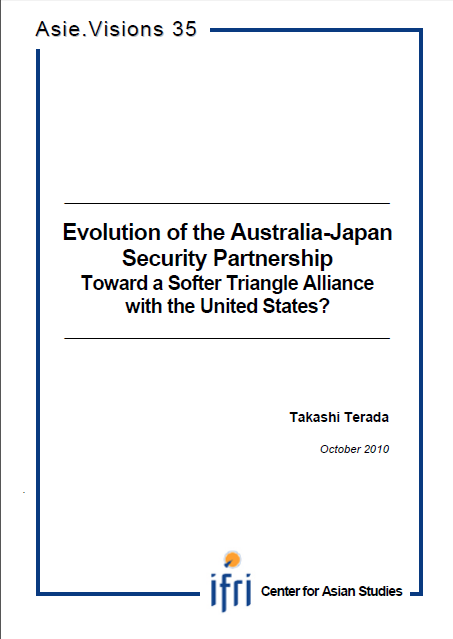Evolution of the Australia-Japan Security Partnership: Toward a Softer Triangle Alliance with the United States?

This paper examines how and why the Australia-Japan defense and security partnership has evolved, what policy implications this new partnership has for the U.S.-Japan alliance system, and what constraints the further advancement of trilateral security cooperation faces.
The U.S. strategic position and defense posture has catalyzed the evolution of the Australia-Japan security and defense partnership. This partnership has helped to sustain the U.S.-Japan alliance through, for instance, deepening Japan's involvement in defense and security arenas, as was seen in the protection of JSDFs in Iraq by Australian forces.
Still, the Australia-Japan security and defense partnership, a relatively new element in the bilateral relationship, is not based on an alliance system like Japan and the United States. It is still in a formative stage and thus requires strong shared strategic interests and common regional understandings to develop.
The convergent views and interests, especially over the approach to the rise of China as a military power, are helping the further development of the trilateral cooperation with the United States within a rapidly changing regional environment.
Download the full analysis
This page contains only a summary of our work. If you would like to have access to all the information from our research on the subject, you can download the full version in PDF format.
Evolution of the Australia-Japan Security Partnership: Toward a Softer Triangle Alliance with the United States?
Related centers and programs
Discover our other research centers and programsFind out more
Discover all our analyses
China’s Strategy Toward Pacific Island countries: Countering Taiwan and Western Influence
Over the past decade, China has deployed a diplomatic strategy toward the Pacific Island Countries (PICs). This strategy pursues two main objectives: countering Taiwan's diplomatic influence in the region and countering the influence of liberal democracies in what Beijing refers to as the "Global South."

Opening up the G7 to South Korea to Address Contemporary Global Challenges
The G7’s global influence has diminished as powers like China reshape international governance through initiatives such as BRICS and the Shanghai Cooperation Organisation (SCO). With the G7 now representing just 10 per cent of the world’s population and 28 per cent of global GDP, its relevance is increasingly questioned.
Expanding SPDMM as a pivotal institution in the Pacific – A French perspective
The South Pacific Defence Ministers’ Meeting (SPDMM) is the only forum that brings together defense ministers from the wider South Pacific — including Chile, which is hosting it for the first time. This heterogeneous group of countries with varying resources, capacities, and interests — Australia, Chile, Fiji, France, New Zealand, Papua New Guinea (PNG), and Tonga — are united by their shared determination to strengthen cooperation on maritime security and humanitarian assistance and disaster relief (HADR) activities.
EU’s Derisking From China: A Daunting Task
With economic security as a major concern, the EU has recently turned to “derisking” from China. The EU strategy entails reducing critical dependencies and vulnerabilities, including in EU supply chains, and diversifying where necessary, while recognizing the importance and need to maintain open channels of communication.









